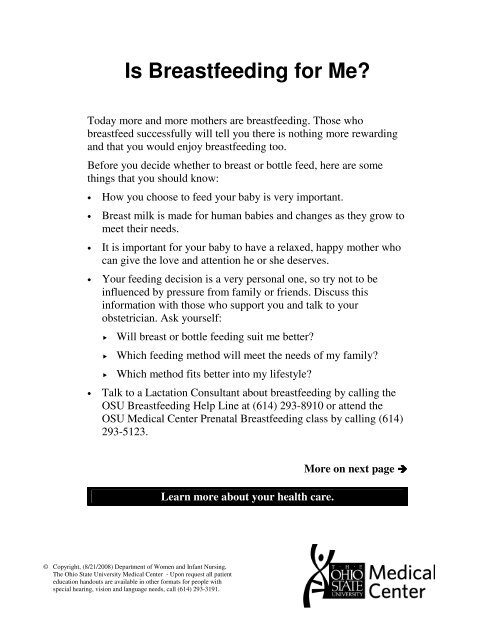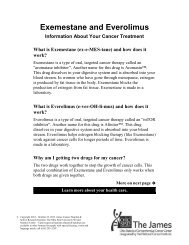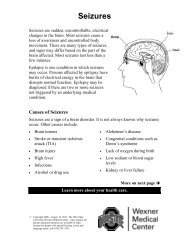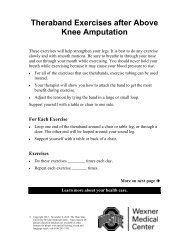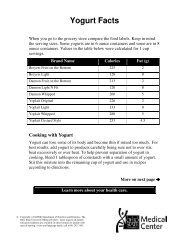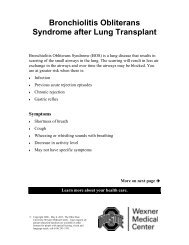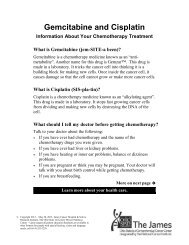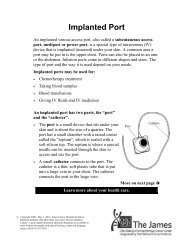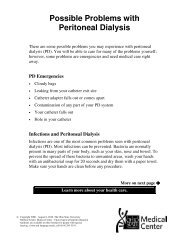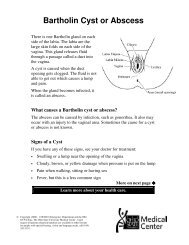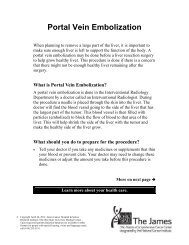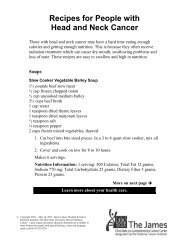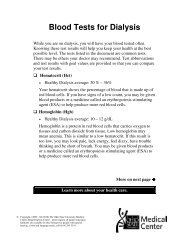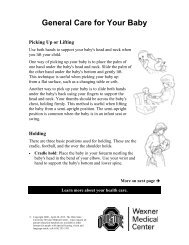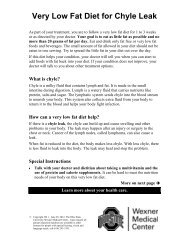Is Breastfeeding for Me? - Patient Education Home
Is Breastfeeding for Me? - Patient Education Home
Is Breastfeeding for Me? - Patient Education Home
Create successful ePaper yourself
Turn your PDF publications into a flip-book with our unique Google optimized e-Paper software.
<strong>Is</strong> <strong>Breastfeeding</strong> <strong>for</strong> <strong>Me</strong>?<br />
Today more and more mothers are breastfeeding. Those who<br />
breastfeed successfully will tell you there is nothing more rewarding<br />
and that you would enjoy breastfeeding too.<br />
Be<strong>for</strong>e you decide whether to breast or bottle feed, here are some<br />
things that you should know:<br />
• How you choose to feed your baby is very important.<br />
• Breast milk is made <strong>for</strong> human babies and changes as they grow to<br />
meet their needs.<br />
• It is important <strong>for</strong> your baby to have a relaxed, happy mother who<br />
can give the love and attention he or she deserves.<br />
• Your feeding decision is a very personal one, so try not to be<br />
influenced by pressure from family or friends. Discuss this<br />
in<strong>for</strong>mation with those who support you and talk to your<br />
obstetrician. Ask yourself:<br />
Will breast or bottle feeding suit me better?<br />
Which feeding method will meet the needs of my family?<br />
Which method fits better into my lifestyle?<br />
• Talk to a Lactation Consultant about breastfeeding by calling the<br />
OSU <strong>Breastfeeding</strong> Help Line at (614) 293-8910 or attend the<br />
OSU <strong>Me</strong>dical Center Prenatal <strong>Breastfeeding</strong> class by calling (614)<br />
293-5123.<br />
© Copyright, (8/21/2008) Department of Women and Infant Nursing,<br />
The Ohio State University <strong>Me</strong>dical Center - Upon request all patient<br />
education handouts are available in other <strong>for</strong>mats <strong>for</strong> people with<br />
special hearing, vision and language needs, call (614) 293-3191.<br />
Learn more about your health care.<br />
More on next page
Page 2<br />
Today we know much more about the many benefits of breast milk.<br />
Breast milk can help keep you and your baby healthy. Talk to your<br />
baby’s doctor about which feeding method is best <strong>for</strong> you and your<br />
baby. You will be doing what is best <strong>for</strong> your baby only if you do<br />
what is best <strong>for</strong> you.<br />
Why should you breastfeed?<br />
• Breast milk is easier <strong>for</strong> your baby to digest<br />
than <strong>for</strong>mula.<br />
• Breast milk is always clean and safe. Your<br />
baby cannot catch a cold from it or be<br />
allergic to the milk.<br />
• Breast milk protects your baby against<br />
colds, infections and allergies by passing<br />
antibodies that fight infections from your<br />
body to the baby’s body. Breast fed babies<br />
have fewer serious illnesses and breast milk<br />
helps prevent diarrhea and other digestive disorders.<br />
• <strong>Breastfeeding</strong> helps your uterus return to its normal size faster.<br />
• No preparation or sterilization of bottles is necessary.<br />
• It is less costly, as there is no need to buy <strong>for</strong>mula or bottles.<br />
• Breast milk is almost always available. How much your body<br />
makes depends on how often your baby nurses. Your body<br />
supplies the amount of milk your baby demands.<br />
• Breastfed babies have less gas, less spitting-up and sweeter<br />
smelling stools.<br />
• <strong>Breastfeeding</strong> often results in more bonding between mother and<br />
baby.<br />
• The government’s WIC (Women, Infants and Children) program<br />
will provide extra food <strong>for</strong> women who breastfeed.<br />
• Most medicines can be taken by mothers who breastfeed.<br />
• After your milk supply is established (4 to 6 weeks), you can give<br />
expressed breast milk from a bottle, if you would prefer.
Other Facts About <strong>Breastfeeding</strong><br />
Page 3<br />
• Your figure and breasts will return to their normal size when you<br />
have finished breastfeeding. Whether or not breasts sag depends on<br />
age, pregnancy and heredity, not breastfeeding.<br />
• Many American women continue breastfeeding even after<br />
returning to work or school. If you want your baby to have all or<br />
mostly breast milk, then you will need to pump your breasts during<br />
the time you are separated. If pumping proves too difficult, many<br />
mothers are able to continue breastfeeding their babies on “off”<br />
hours and have <strong>for</strong>mula be given during the workday. Your body<br />
will adjust to not making milk after several days. Please call the<br />
OSU <strong>Breastfeeding</strong> Helpline at (614) 293-8910 <strong>for</strong> guidelines on<br />
how to achieve this and allow at least 2 weeks <strong>for</strong> your body to<br />
adjust. Many mothers can nurse their babies once or twice a day<br />
<strong>for</strong> many months without expressing their milk between<br />
breastfeedings.<br />
• All new mothers need to eat well-balanced, regular meals. Nursing<br />
mothers often return to their pre-pregnancy weight be<strong>for</strong>e mothers<br />
who bottle feed because they burn extra calories which were<br />
gained during pregnancy.<br />
• If you nurse, drink enough liquid to satisfy your thirst. Some<br />
mothers drink a glass of water each time they breastfeed.<br />
• A nap during the day may be needed to give your body extra<br />
energy to make breast milk.<br />
• A woman can easily breastfeed her baby in public by dressing<br />
conveniently.<br />
Can anyone breastfeed?<br />
You can successfully breastfeed if you want to, unless your doctor<br />
says it is medically unsafe to do so. Do not worry about not knowing<br />
how to breastfeed, as the nurse in the hospital will be very helpful.<br />
Breast size has nothing to do with how much milk you can produce. It<br />
is your baby’s suckling that starts milk production. The more your<br />
baby suckles the more milk you will make.
Page 4<br />
What about bottle feeding?<br />
• Bottle feeding can be done by fathers or helpers<br />
right away. <strong>Breastfeeding</strong> mothers will want to<br />
wait 3 to 4 weeks.<br />
• Nursing takes more commitment from the<br />
mother because the baby will need to be fed<br />
every 2 to 3 hours (8 to 12 feedings each day)<br />
during the first few weeks. If you bottle feed,<br />
your baby will eat 6 to 8 times a day, have<br />
shorter feedings, and can be fed by another<br />
family member.<br />
• Formula is sold in most food and drug stores, and although very<br />
expensive, is available in ready to use cans and bottles.<br />
• The government’s WIC program provides <strong>for</strong>mula to eligible<br />
families.<br />
• You may be more com<strong>for</strong>table feeding your baby from a bottle<br />
when in public.<br />
• Bottle feeding requires sterilization and cleaning of equipment,<br />
mixing <strong>for</strong>mulas, and making sure that the <strong>for</strong>mula does not spoil<br />
be<strong>for</strong>e being offered.<br />
• Not all babies can tolerate cow or soy-based <strong>for</strong>mulas.<br />
• Formula-fed infants have more ear infections and upper respiratory<br />
infections, and are more likely to suffer allergies.<br />
• Bottle fed babies have more gas during feedings, tend to spit-up<br />
more than breastfed babies, and have foul-smelling stools.<br />
■ Talk to your doctor or others on your health care team if you<br />
have questions. You may request more written in<strong>for</strong>mation<br />
from the Library <strong>for</strong> Health In<strong>for</strong>mation at (614) 293-3707 or<br />
email: health-info@osu.edu.


